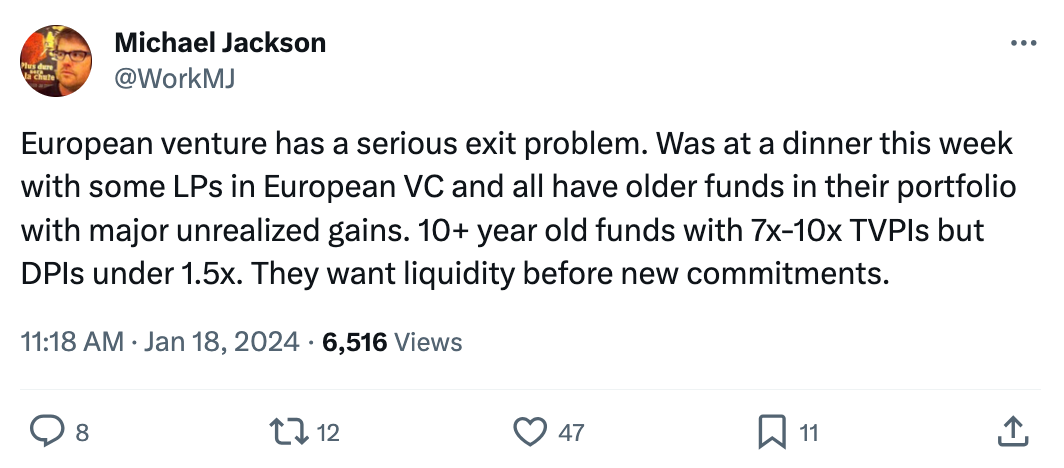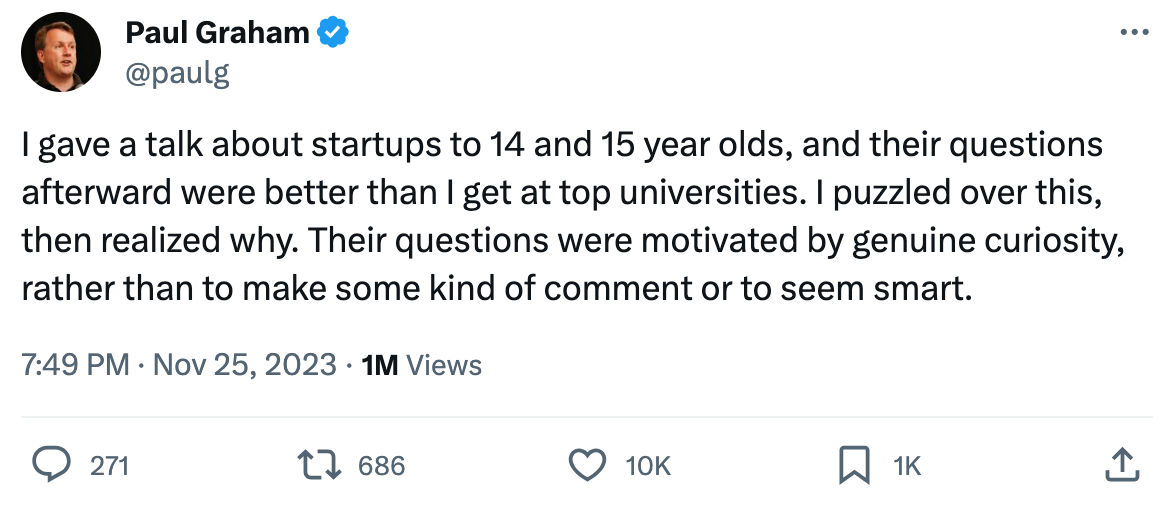Moneyball is a newsletter from Koble exploring the limitations of human decision-making and their implications for startup investing.
We’ve spent two years developing our groundbreaking algorithms, which discover early-stage startups that outperform the market and predict their probability of success.
This week
🧠 Mental Model #30 – Last-mover Advantage – Playing The Endgame
📖 Investor reading – Why Hedge Funds are Packing Up and Leaving VC – AI’s Journey From Enhancing Operational Efficiency To Alpha Generation – LPs Doubt Venture Funds’ Startup Valuations
💬 Some tweets – European venture has a serious exit problem – One of the strangest ZIRP / venture boom phenomena was startups investing in other startups – I gave a talk about startups to 14 and 15 year olds
Playing The Endgame
Being the first installment of a two part blog series on Venture Capital’s endgame.
Many household name tech companies launched with products that felt bizarrely niche and exhilaratingly new.
But getting started is different to getting big, and strategies adopted by startups to create new markets are different to those employed by companies seeking scale.
What if long term success is less about being first, and more about being last?
In praise of last-movers
In his book Zero to One, Peter Thiel emphases the importance of understanding the endgame, quoting chess grandmaster José Raúl Capablanca:
“To succeed, you must study the endgame before everything else.”
It’s this “last-mover advantage” that defines the world’s largest companies and shapes our experience of technology and culture. Personal computers, video gaming, search engines, social networks… all massive markets in which pioneers were eclipsed by late movers:
The last operating system – MS-DOS > Microsoft
The last search engine – Yahoo > Google
The last social network – MySpace > Facebook
The last music platform – Pandora > Spotify
The last photo sharing app – Flickr > Instagram
Tomasz Tunguz has noted that the last-mover is the embodiment of Clayton Christensen’s Innovator’s Dilemma. It’s the company that does it faster, better, or cheaper, cannibalizing an incumbent’s business with a lower cost structure.
And researchers Venkatesh Shankar, Gregory S. Carpenter, and Lakshman Krishnamurthi have shown using data from 13 pharmaceutical brands that innovative late-movers can create a sustainable advantage, with higher market potential and a higher repeat purchase rate than pioneers or non-innovative late movers.
Research shows that market share leadership for pioneers is supported in only 4 of 50 product categories. In a paper entitled “Pioneer Advantage”, Gerard J. Tellis analyzed 500 brands in 50 product categories, with fascinating (and counterintuitive) results:
Mean market share of market pioneers is 10%
47% of pioneers fail
11% of pioneers are current market leaders
Pioneers are typically market leaders for only 5-10 years
It’s good to learn from your mistakes, but it’s better to learn from other people’s (thank you Warren Buffett). This is the secret to leveraging last-mover advantage. It’s a question of timing.
The playbook is simple: last-movers hang back and let others innovate whilst they analyse the dynamics and structure of the market. Then they enter decisively, committing large amounts of resources to building and leading the market.
This time it’s different
Throughout history, the last mover has introduced the critical innovation – the last great product development – to entrench its position. It has then leveraged its financial resources, intellectual property, economies of scale, and brand recognition to consolidate control over a market for very long periods.
The ongoing emergence of massive computing power and AI models strengthens the ability of incumbents to perpetuate their hegemony over markets.
Everyone is very excited about the potential of data to transform the human experience. Few have recognised that AI may well be a “first around the post” phenomenon – the end of competition (and choice) as we know it.
Data enables last-movers to play offense and defense simultaneously; optimising user experiences whilst anticipating discontinuities that could threaten their dominance and closing them down.
AI is different from previous technological revolutions, since it relies so heavily on data. Companies that start collecting, analyzing and actioning data will drive further improvement in their models, building unassailable competitive advantages.
Humans are not good at thinking exponentially, which is why so few people are talking (and panicking) about this.
Implications for investors
We’ve seen how last-mover advantage works in startups. But the same applies to Venture Capital.
The mathematics of investing don’t change. But the way that investing is done – the underlying process of sourcing, evaluating, and backing startups – can be re-engineered with technology to provide better (and more predictable) returns to investors, founders, and society at large.
Work with Koble
At Koble, we’ve spent two years developing our groundbreaking algorithms, which discover early-stage startups that outperform the market and predict their probability of success.
We’re working with forward-thinking angels, VCs, family offices, and hedge funds to re-engineer startup investing with AI. If that resonates, get in touch.
Investor reading
🏃♂️ Why Hedge Funds are Packing Up and Leaving VC – Hedge funds made a massive push into venture capital during the pandemic, fuelling the tech dealmaking boom. Now they’re selling startups in the secondary markets.
🤖 Venture Capital’s New Era: AI’s Journey From Enhancing Operational Efficiency To Alpha Generation – In the ever-evolving landscape of venture capital, AI has emerged not just as a tool but as a transformative force.
📉 LPs Doubt Venture Funds’ Startup Valuations – Investors in venture funds are scrutinizing unrealized returns for overly optimistic projections, slowing down fundraising processes.
Some tweets
Parting shot
“The creative process is a process of surrender, not control.”
― Bruce Lee
Regards from your [last-mover] startup investing AI,
About Koble
Koble is re-engineering startup investing with AI, applying quantitative strategies that have disrupted public markets to early-stage startup investing.







